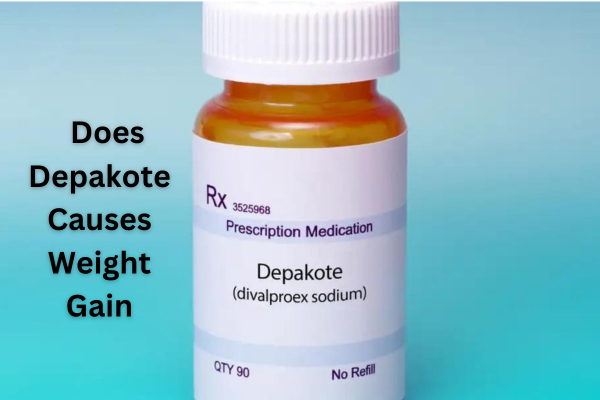Depakote, also known by its generic name valproate semi-sodium, is a widely prescribed medication primarily used to treat epilepsy, bipolar disorder, and migraines. While it has proven to be effective in managing these conditions, there have been concerns regarding potential side effects, including weight gain. In the following article, we shall delve into the link between Depakote and weight gain, understand the underlying cause it does and its mechanisms, and discuss strategies to manage weight while taking the medication.
Understanding Depakote
Depakote is an anticonvulsant and mood-stabilizing drug that works by influencing the equilibrium of specific brain neurotransmitters. By regulating the release of gamma-aminobutyric acid (GABA), it helps to control abnormal electrical activity in the brain, reducing seizures and stabilizing mood swings associated with bipolar disorder.
Does Depakote Cause Weight Gain?
The link between Depakote and weight gain is not fully understood, but it is believed to be multifactorial. Some of the reasons that might contribute to weight gain while taking Depakote include:
1. Increased Appetite
Depakote could potentially stimulate appetite or alter the brain’s hunger signals, leading to increased food intake.
2. Hormonal Changes
Depakote may influence the hormones involved in metabolism and appetite regulation, potentially leading to weight gain.
3. Fluid Retention
Some individuals may experience water retention as a side effect of the medication, which can result in temporary weight gain.
4. Slower Metabolism
Depakote could potentially slow down metabolic processes, making it easier to gain weight even with normal caloric intake.
Managing Weight While on Depakote
If you are taking Depakote and are concerned about weight gain, it is essential to work closely with your healthcare provider. Here are some strategies that may help manage weight while on the medication:
1. Balanced Diet
Adopt a well-balanced, nutritious diet that includes fruits, vegetables, lean proteins, and whole grains. Limit the intake of sugary and high-calorie foods.
2. Regular Exercise
Participate in consistent physical exercise, such as walking, jogging, swimming, or yoga, to help maintain a healthy weight and improve overall well-being.
3. Portion Control
Practice portion control to prevent excessive consumption of food, especially if you notice an increased appetite while on Depakote.
4. Monitor Fluid Intake
If you suspect fluid retention, monitor your fluid intake and discuss it with your healthcare provider.
5. Medication Adjustment
If weight gain becomes a significant concern, your doctor may consider adjusting the dosage of Depakote or switching to an alternative medication with a lower risk of weight gain.
6. Mental Health Support
If you are taking Depakote for bipolar disorder, managing your mental health is crucial. Do well to consult a therapist or counselor if you need assistance managing mood swings and emotional eating as a result of taking Depakote.
7. Regular Check-ups
Attend regular check-ups with your healthcare provider to monitor your weight, overall health, and any potential side effects of Depakote.
Major Side Effects of Depakote
It is crucial to take note of these possible side effects and have a conversation about them with your medical professional before starting Depakote. Depakote’s main adverse effects include:
1. Weight Gain
One of the more common side effects associated with Depakote is weight gain. Some individuals may experience an increase in appetite or metabolic changes that lead to weight gain.
2. Gastrointestinal Disturbances
Depakote can cause gastrointestinal issues such as nausea, vomiting, stomach pain, and diarrhea, especially during the initial phase of treatment. It might be easier to manage these symptoms if you take the medication with food.
3. Drowsiness and Dizziness
Depakote may cause drowsiness and dizziness, particularly when starting the medication or during dosage adjustments. It is crucial to refrain from driving or operating heavy equipment until you understand how the drug affects you.
4. Hair Loss
Some individuals may experience temporary hair loss while taking Depakote. Hair usually regrows once the medication is discontinued or the dosage is adjusted.
5. Tremors
Depakote can lead to fine tremors in the hands or other parts of the body, particularly at higher doses.
6. Liver Function Abnormalities
Depakote may affect liver function, leading to elevated liver enzymes. Regular liver function tests are often recommended while on the medication.
7. Pancreatitis
In rare cases, Depakote may cause inflammation of the pancreas (pancreatitis), which can be serious. Severe stomach discomfort, nausea, and vomiting are possible symptoms. If these symptoms appear, medical attention must be sought right once.
8. Blood Disorders
Depakote can affect blood cells, leading to a decrease in platelet count or other blood disorders. The likelihood of bleeding or bruising may rise as a result.
9. Allergic Reactions
Some individuals may experience allergic reactions to Depakote, which can present with symptoms like skin rash, pruritus, facial or throat edema, and respiratory distress. If you have these symptoms, get emergency medical treatment.
10. Cognitive and Behavioral Changes
In some cases, Depakote may cause cognitive side effects, including memory problems, confusion, or changes in behavior or mood.
11. Birth Defects
Depakote is associated with an increased risk of birth defects if taken during pregnancy. Pregnant women or women planning to become pregnant should seek guidance from their medical professional to talk about the possible advantages and drawbacks of using Depakote.
Conclusion
Depakote is an effective medication used to manage epilepsy, bipolar disorder, and migraines. However, weight gain is a potential side effect that some individuals may experience while taking the drug. Understanding the possible cause of weight gain and adopting healthy lifestyle habits can help mitigate this side effect. If you are concerned about weight gain or any other side effect while on Depakote, don’t hesitate to communicate with your healthcare provider, as they can guide you in finding the most suitable treatment and support you on your journey to better health. Remember, everyone’s response to medication is unique, and with the right approach, it is possible to manage potential side effects and lead a fulfilling life while on Depakote.






